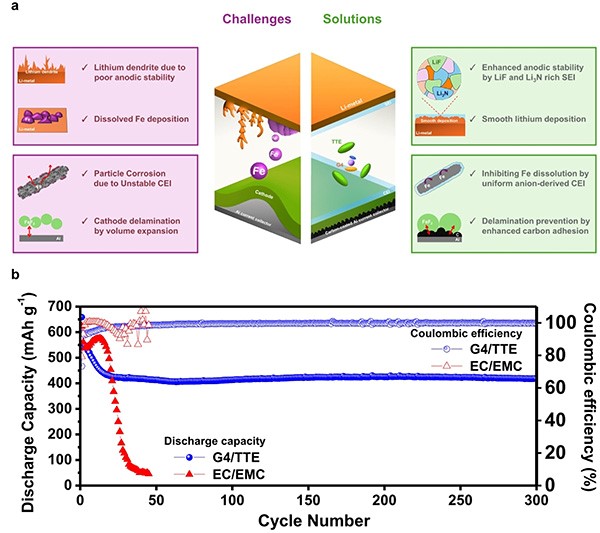Prof. Min-Kyung Kim‘s Research Team Develops Low-Cost, High-Energy Lithium-Ion Batteries
- admin
- 2024-11-19
- 36
?· Prof. Min-Kyung Kim‘s Research Team (Department of Electronic Materials Engineering) Develops Low-Cost, High-Energy Lithium-Ion Batteries Using Iron-Based Cathode Materials
133 views | Created 2024.11.04 | Modified 2024.11.04 |
Public Relations Team
·
Professor Min-Kyung Kim‘s Research Team (Department of Electronic Materials
Engineering)
Develops Low-Cost, High-Energy Lithium-Ion
Batteries Using Iron-Based Cathode Materials
- Develops a synthesis method for
high-capacity iron-based conversion-type cathode materials and micro-particle
utilization technology -
- Develops electrolyte suitable for
conversion-type cathode materials and lithium-metal anodes -

A research team led by Professor Min-Kyung Kim
(pictured) from the Department of Electronic Materials Engineering at our
university has developed a low-cost, high-energy lithium-ion battery using
iron-based cathode materials.
Lithium-ion batteries are recognized as
crucial energy storage devices for a variety of applications and are being
developed to achieve next-generation goals of safety, low cost, and high energy
density. Among these, conversion-based batteries are promising candidates due
to their high energy density. Specifically, iron fluoride (FeF2) offers the
advantages of low cost and high energy density. However, current challenges
include limitations in synthesis processes, low lithium/electron conductivity,
and cycle stability. To address these issues, the development of nanoparticles
has become common practice.
To address the reduced energy density per
volume of nanoparticles and achieve commercialization, the development of
larger particle sizes is essential. However, as particle size increases,
reactivity decreases, leading to limitations in reversible capacity. In
response, the research team synthesized micron-sized FeF2 materials and
enhanced their reactivity through internal porosity, developing materials with
high capacity. Additionally, the team analyzed the causes of material
degradation during charge and discharge cycles and achieved high cycle
stability by improving current collectors and developing advanced electrolytes.

This research is the result of a collaborative effort by first-year
master's students Chi-Won Choi and Hyun-Min Yoon (Department of Electronic
Materials Engineering), who began contributing as undergraduate researchers. The
research findings were published in the prestigious journal Advanced Science (IF
= 14.3, JIF = 93.5%) under the title "Achieving High Stability and
Capacity in Micron-Sized Conversion-Type Iron Fluoride Li-Metal
Batteries."
Professor Min-Kyung Kim stated, "This
research makes a significant contribution to the development of next-generation
lithium-metal batteries and provides a new direction for the practical
application of conversion-type metal fluorides."
The research was supported by the NRF Young
Researcher Program, the Korea Planning & Evaluation Institute of Industrial
Technology
(2022R1C1C1011543), and the POSCO TJ Park
Foundation. Additionally, the research was supported by the NRF Master's
Research Encouragement Grant, awarded to Chi-Won Choi.
https://www.kw.ac.kr/ko/life/research.jsp?BoardMode=view&DUID=48212?